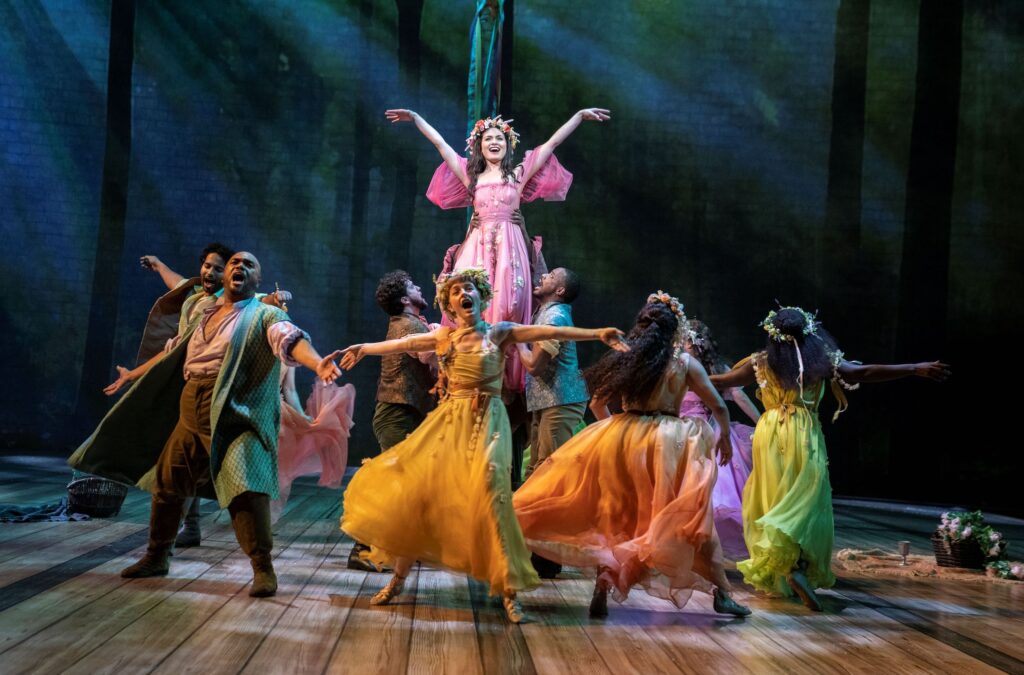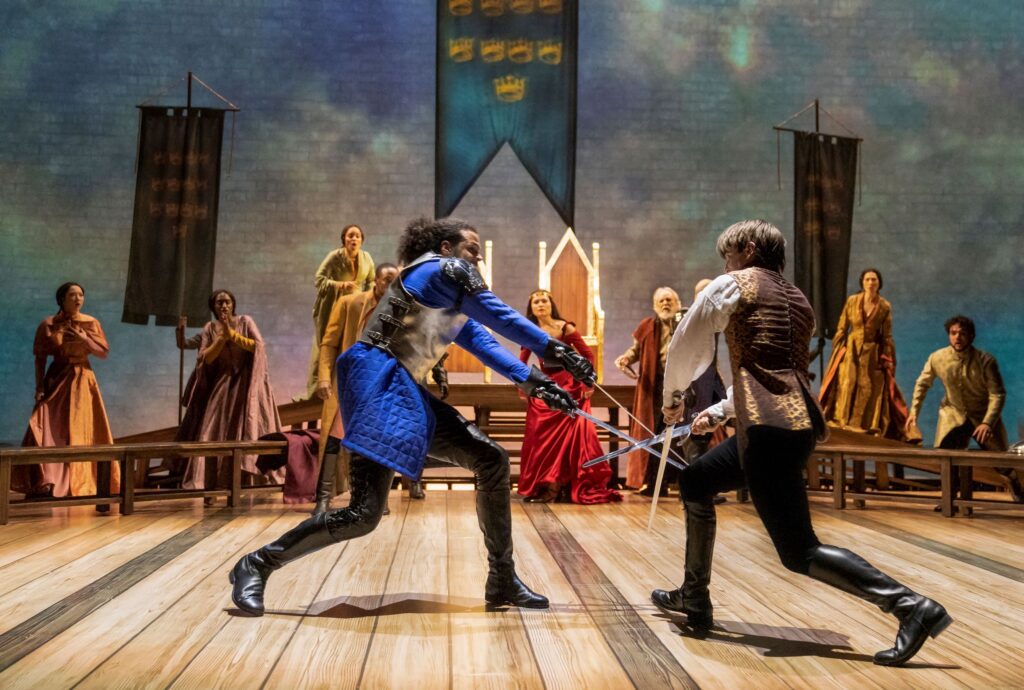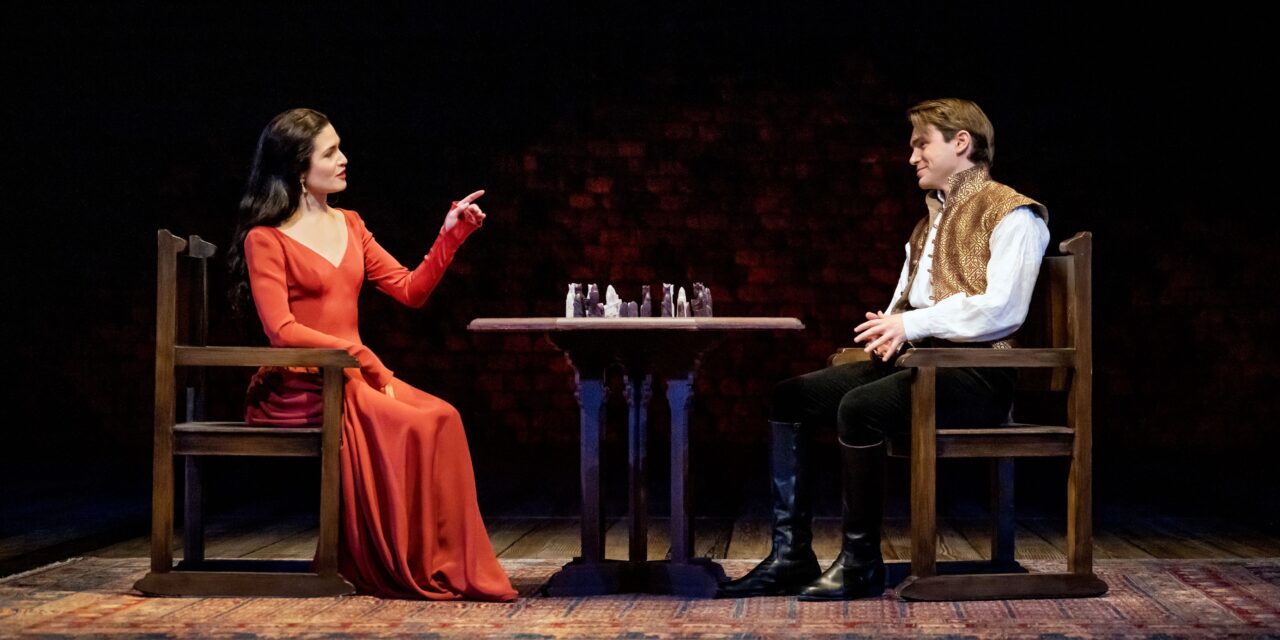By Brian Scott Lipton . . .
“Camelot. Camelot. I know it sounds a bit bizarre.” In reality, the most bizarre thing about the original 1960 production of this now-legendary musical re-telling of the reign of King Arthur wasn’t its fanciful descriptions of England’s weather, but the fact that Alan Jay Lerner and Frederic Loewe wrote one of the most glorious scores ever to grace Broadway, while at the same time Lerner crafted one of the medium’s most tedious, overlong books.
So, it’s a pleasure to report that Bartlett Sher’s elegant revival, now at Lincoln Center’s Vivian Beaumont Theatre, is definitely a vast improvement. This production rarely drags, thanks to the consistently compelling, beautifully sung performances by Tony Award winner Andrew Burnap as Arthur, Philippa Soo as his once-reluctant queen, Guinevere, and, especially, the strapping Jordan Donica as the boastful French knight Lancelot, torn between his loyalty to Arthur and love for “Jenny” (as the Queen is nicknamed).

True, “Camelot” is less opulent than Sher’s previous shows — Michael Yeargan minimalist set makes great use of the Beaumont’s deep stage but could use more furnishings, while Jennifer Moeller’s costumes seem mostly uninspired – but there are many gorgeous stage pictures to delight the eye.
Still, any hopes for a book that matches the brilliance of Lerner and Loewe’s lyrical score – which ranges from unforgettably gorgeous love songs such as “If Ever I Would Leave You” and “Before I Gaze at You Again” to clever rondelets like “The Merry Month of May” and “What Would the Simple Folk Do?” – are not completely fulfilled by the often-brilliant Aaron Sorkin.
He solves some of the original book’s problems while creating some new, even more problematic ones. Admittedly, some of these alterations may only be noticeable to those with a deep knowledge of the original production (although I suspect everyone will notice the extremely contemporary language, which didn’t bother me one bit!)
For example. Sorkin has all touches of magic from the story. As a result, Arthur’s advisor Merlin (a humorous Dakin Matthews, who eventually doubles superbly as the elderly, bumbling Sir Pellinore) is now just a wise, unusually old man, and the story of Arthur’s ascent to the throne by pulling out Excalibur from a piece of a stone is now just an odd feat of human nature, (Essentially, 999 people loosened it up for him!)
These changes actually humanize Arthur, who as stunningly portrayed by Burnap, is a young man (perhaps 20 at the story’s start) of non-noble birth who realizes he’s unprepared for what awaits him but remains determined to transform England into a land of equality and “right for might. These goals please Jenny and Lancelot, but not Arthur’s main knights Lionel, Dinadan and Sargamore (Danny Wolohan, Anthony Michael Lopez and Fergie Philippe), who represent the noble class.


Indeed, the political is just as important as the personal here, and many of the characters occasionally spout dialogue that could have come from an episode of Sorkin’s “The West Wing” or his adaptation of “To Kill a Mockingbird” — not to mention one Arthurian jibe that seems directly aimed at Donald Trump. (Sorkin is to be commended for all the humor he has injected into the script, appropriately or otherwise!)
Conversely, Sorkin’s desire to remove the supernatural from the story leads him into trouble, late in Act II, when Arthur is tricked by illegitimate, bitter teenaged son Mordred (Taylor Trensch, having fun) into visiting his mother, Morgan Le Fey (a fine Marilee Talkington). No longer an enchantress (who was convinced by Mordred to trap Arthur inside invisible walls to give him time to find Jenny and Lance in a treasonous embrace), Morgan is now a “scientist” babbling nonsense, and their scene – though shortish – feels interminable.
Still, the new script’s biggest misstep is to put Arthur and Guinevere into a completely sexless, arguably loveless marriage that Arthur eventually deems “a business partnership.” Those of us who know he fathered Mordred when he was 15 know he’s not a virgin, and there’s no homoeroticism (thankfully) between him and Lancelot, so it’s unclear why they’re not sharing a marital bed.
Moreover, Soo is incredibly attractive, and Jenny, although originally just as immature as Arthur, eventually proves to be his intellectual equal. She is truly a match fit for a king! Still, Arthur seems all-too-willing to let her and Lancelot exchange longing looks (since that’s not illegal) and even handles her eventual betrayal with seemingly surprising equanimity.
Yes, Sorkin eventually hands us a somewhat shocking revelation about five minutes before the show is over, which if it had been spoken aloud (or hinted at more broadly earlier) would absolutely have deepened the show and given it the spark it needed to ignite. Indeed, the choice to hide such crucial information up Sorkin’s sleeve is not just misguided magic, but the most bizarre thing about this new, often-pleasing adaptation.
Photos: Joan Marcus (Featured Image: Philippa Soo, Andrew Burnap
- This review was previously published by Cititour.com


















